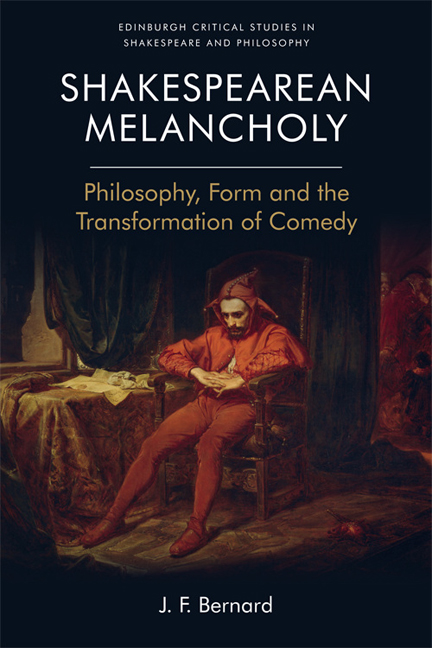Book contents
- Frontmatter
- Contents
- Acknowledgements
- Series Editor's Preface
- Miscellaneous Frontmatter
- 1 What's so Funny about Humours? Melancholy, Comedy and Revisionist Philosophy
- 2 Comic Symmetry and English Melancholy
- 3 Melancholic Dissonance and the Limits of Psycho-Humoralism
- 4 Melancholic Ambience at the Comic Close
- 5 Melancomic Time in Late Shakespeare
- 6 The Philosophical Afterlives of Shakespearean Melancholy
- Works Cited
- Index
6 - The Philosophical Afterlives of Shakespearean Melancholy
Published online by Cambridge University Press: 14 September 2018
- Frontmatter
- Contents
- Acknowledgements
- Series Editor's Preface
- Miscellaneous Frontmatter
- 1 What's so Funny about Humours? Melancholy, Comedy and Revisionist Philosophy
- 2 Comic Symmetry and English Melancholy
- 3 Melancholic Dissonance and the Limits of Psycho-Humoralism
- 4 Melancholic Ambience at the Comic Close
- 5 Melancomic Time in Late Shakespeare
- 6 The Philosophical Afterlives of Shakespearean Melancholy
- Works Cited
- Index
Summary
We of the craft are all crazy. Some are affected by gaiety, others by melancholy, but all are more of less touched.
(Lord Byron)Charlie Chaplin famously said that life was a tragedy when seen in close-up but a comedy when in long shot. Melancholy operates similarly in Shakespearean comedy. Taken individually, the depictions in each play appear problematic, even antithetical to comedy. At a distance, they form a much more congruous view of the dual revisions of melancholy and the comic genre that take place throughout Shakespeare's work. The works ultimately present melancholy and mirth as oscillating dramatic forces that form complementary dimensions of the human experience as depicted on the early modern Shakespearean stage. My interpretation does not take away from tragic melancholy and the voluminous critical body of work it has generated; rather, it enhances it by showing the comic value of early modern melancholy. This understanding also offers the opportunity to reconsider and amend some of the major theoretical engagements with melancholia in terms of the comic philosophy I have outlined here.
In this chapter, I consider the afterlives of Shakespearean comic melancholy in terms of psychoanalysis, performance theory and affect theory so as to chart out previously unacknowledged interplay between the modern concept of melancholia and the humour's comic heritage as developed throughout this book. Taking as a point of departure Juliana Schiesari's claim that ‘Renaissance and postmodern melancholias [are not] two different periods of dramatized loss but rather … the historical boundaries of a great age of melancholia … whose edges are coterminous with the historic rise and demise of the subject’, I want to examine potential critical contributions that a comic understanding of melancholy could bring to the works of Sigmund Freud, Judith Butler and Sianne Ngai. Tragic representations of melancholy, such as in Hamlet, offer an ideal literary analogy for the processes of subject formation and internalisation of loss at the crux of psychoanalytic and performative investigations of melancholia. Comic melancholy necessitates a slight redirection in critical focus since it avoids the catharsis of death and the heroic sense of despair that generally characterise tragic melancholics.
- Type
- Chapter
- Information
- Shakespearean MelancholyPhilosophy, Form and the Transformation of Comedy, pp. 213 - 233Publisher: Edinburgh University PressPrint publication year: 2018



